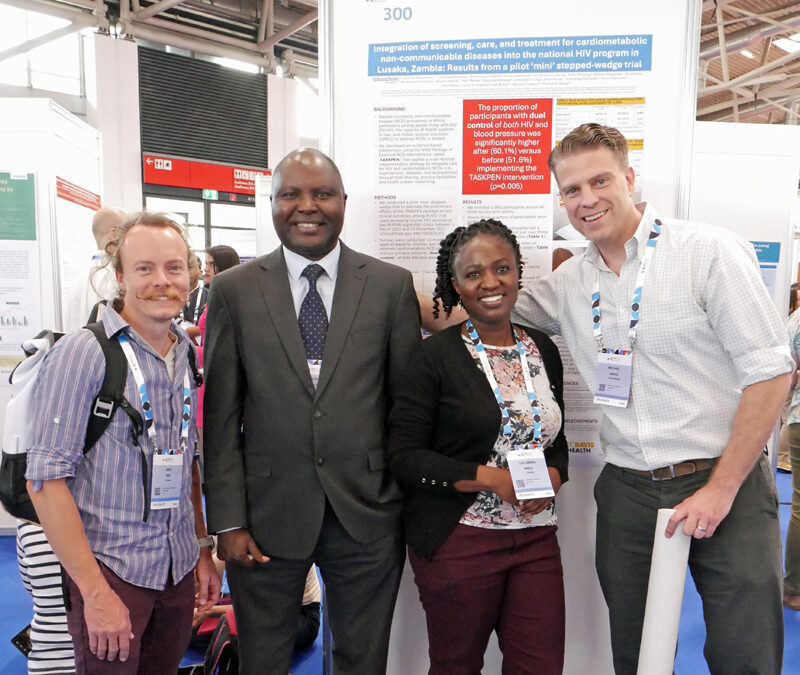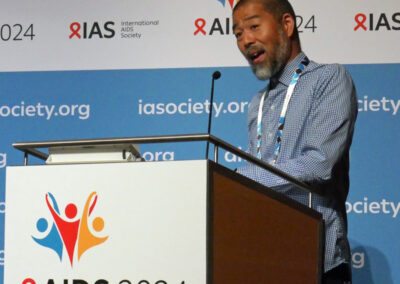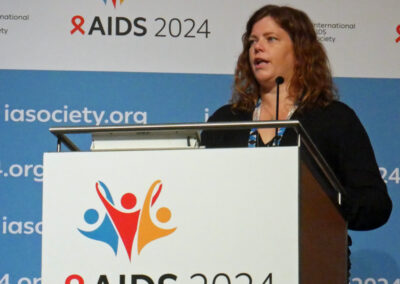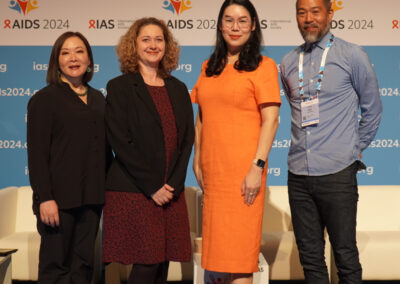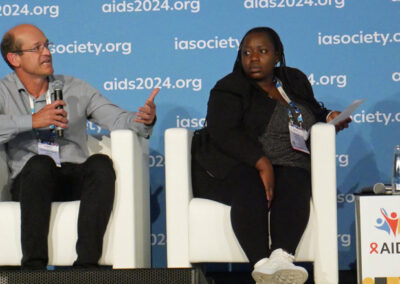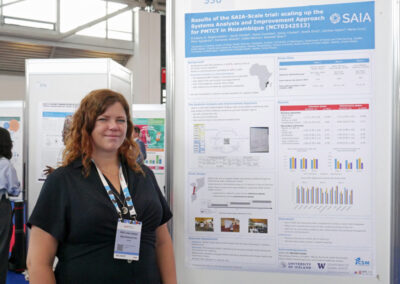Jake Pry, Wilbroad Mutale, Chilambwe Mwila, and Michael Herce from the HLB-SIMPLe’s TASKPEN project in Zambia pose in front of a poster showcasing their work at the AIDS Conference in Munich, Germany, in July 2024. (PHOTO: RCC/April Houston)
Written by April Houston
The 2024 AIDS Conference was held in Munich, Germany, in July, and researchers from the HLB-SIMPLe Alliance presented a range of innovative approaches and critical insights into HIV response and broader health issues.
Kristjana Asbjornsdottir speaks at the 2024 AIDS Conference
Kristjana Asbjornsdottir (SCALE SAIA-HTN Mozambique), provided a review of current implementation strategies and outlined future research directions for HIV programs at a pre-conference event.
Speakers at the implementation science and the HIV response pre-conference
Annette Sohn, Maggie Czarnogorski, Rena Janamnuaysook, and Elvin Geng at the 2024 AIDS Conference pre-conference session: Securing progress and extending impact: Implementation science and the HIV response.
Claudia Ordóñez at the 2024 AIDS Conference
Claudia Ordóñez (iHEART-SA South Africa) gave a presentation titled, “Exploring the impact of religion and spirituality on health: HIV, beliefs and epistemic inclusion in South Africa” as part of a panel discussion on the role of the faith sector in fighting AIDS.
Francois Venter on a panel at the 2024 AIDS Conference
Francois Venter gave multiple presentations at the AIDS Conference, speaking on how to leverage pharmaceutical innovations to end the HIV pandemic and discussing the need for personalized approaches in antiretroviral therapy.
Dike Ojji presenting at the 2024 AIDS Conference
Dike Ojji (MAP-IT Nigeria) submitted a pre-recorded presentation that was included in the session, “DSD beyond HIV – case studies from NCDs” at the 2024 AIDS Conference.
Kristjana Asbjornsdottir presents a poster at the 2024 AIDS Conference.
Dr. Kristjana Asbjornsdottir presented a poster, titled “Results of the SAIA-Scale trial: scaling up the Systems Analysis and Improvement Approach for PMTCT in Mozambique.”
The pre-conference satellite session “Implementation research and the HIV response: Taking stock and charting the way forward,” facilitated by Elvin Geng (RCC) and featuring a presentation by Kristjana Asbjornsdottir (SCALE SAIA-HTN Mozambique), provided a review of current implementation strategies and outlined future research directions for HIV programs.
Dr. Asbjornsdottir also presented a poster at the event, titled “Results of the SAIA-Scale trial: scaling up the Systems Analysis and Improvement Approach for PMTCT in Mozambique.”
Claudia Ordóñez (iHEART-SA South Africa) gave a presentation titled, “Exploring the impact of religion and spirituality on health: HIV, beliefs and epistemic inclusion in South Africa” as part of a panel discussion on the role of the faith sector in fighting AIDS.
Dike Ojji (MAP-IT Nigeria) did not attend the meeting in person, but he ensured the lessons his team has learned were part of the record, submitting a pre-recorded presentation that was included in the session, “DSD beyond HIV – case studies from NCDs”.
iHEART-SA South Africa’s Francois Venter gave multiple presentations during the event, speaking on how to leverage pharmaceutical innovations to end the HIV pandemic and discussing the need for personalized approaches in antiretroviral therapy.
Through a pre-recorded talk, Chris Longenecker (PULESA Uganda) discussed global health reciprocal innovations at a session organized by the Fogarty International Center and the Health Resources and Services Administration, sharing insights on optimizing global health interventions through research partnerships and knowledge exchange between high-income and low- and middle-income countries.
Various posters highlighted pieces of HLB-SIMPLe’s work, including findings from the TASKPEN pilot project in Zambia – Wilbroad Mutale, Michael Herce, Chilambwe Mwila, and Jake Pry from the TASKPEN team were all there to answer questions from attendees.
The conference in Munich showcased a depth and diversity of expertise within the HIV and global health community. By being part of the event, HLB-SIMPLe researchers not only advanced the scientific dialogue but also fostered a more inclusive and effective global response to HIV and NCDs and other related health challenges.
HLB-SIMPLe is funded by the Center for Translation Research and Implementation Science at the National Heart, Lung, and Blood Institute (NHLBI) and the Fogarty International Center at the US National Institutes of Health (NIH).

